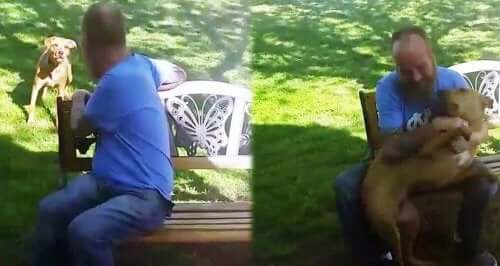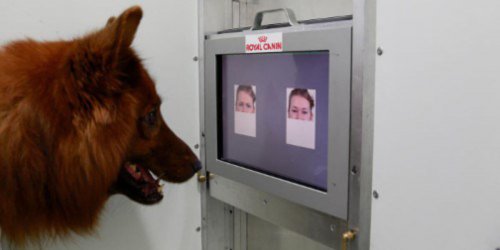The Dog Who Didn't Recognize His Guardian After Weight Loss

The connection between people and animals is well-known. It’s amazing how a pet can identify their family several days, weeks or months after seeing them last. They can even detect us miles away as we return from a trip. It’s for this reason that we’re a bit shocked about the story of a dog who didn’t recognize his guardian after the man lost several pounds. We’ll tell you what we know about it.
Dogs and humans get along famously and have done for many, many centuries. So much so, that it’s safe to state that we’re each other’s very best friends in the whole wide world. However, there are times when this bond may falter a bit. Particularly after someone’s appearance changes drastically.
A dog doesn’t recognize his guardian
A man spent several weeks in the hospital due to an illness that led to extreme weight loss –about 40 pounds. Then he returned home hoping to enjoy some time playing with his dog Willy.
However, the dog wasn’t as happy to see him as he expected him to be. In fact, not at all, because the man was just another stranger to the dog. The man called Willy over, and the animal tried to find his human friend through the voice that sounded just like him.
However, in the meantime, he started to bark at the “intruder” in front of him, the same one who had the nerve to sneak into his house. Of course, everything changed in the end when the dog finally approached the “stranger” and sniffed him.
It was at that moment that Willy realized the stranger was his beloved guardian who wasn’t as big as he remembered him. It’s then when the dog bursts into excitement and shows it by jumping all waggy tailed around him.
It’s kind of funny to see the animal’s reaction. How he was somewhat distrustful at the beginning. Then confused but curious, but, in the end, very happy to see him.
Dogs can definitely recognize human faces
The problem Willy had identifying his guardian was that he couldn’t recognize his face due to the extreme weight loss he underwent. After all, the man did look very different from his former self and had been away from the dog for a while.
Well, this is something that could surely happen with other pets. According to some studies on facial recognition, dogs can, in fact, distinguish the features of the faces they know. Be it people or other animals.
We were under the impression that only humans and primates could recognize facial features. But now, this investigation has confirmed that dogs can do it too. Visual contact is very important to a dog.
Aren’t you amazed at how intently they look at you when you talk to them? This is precisely how they can remember the features of any person. They may also recognize specific facial movements such as how a mouth looks when it smiles, or how it looks when it frowns in anger, etc.
Research of facial recognition

Researchers evaluated the reactions of a group of dogs as they looked at pictures of their owners. They threw pictures of dog strangers and unknown humans into the mix, of course.
What the study revealed was dogs stood longer in front of the pictures of those they knew in order to look closely at them. In contrast, they paid less attention and were distracted when they didn’t recognize the person or animals in an image.
One of the things that most amazed the researchers was that even when they can recognize humans, they’re far more interested in other dogs, whether they know them or not. It may be because they have a lot more in common with them. They need to analyze if the other animal is a threat or a leader, and how to act before them.
So now you know. When your dog stares at you, they do so because they’re studying your features in order to imprint you in their memory and be able to recognize you later.
Well, unless you lose several pounds in a short amount of time and they don’t see you for a while, that is. The moral of the story, continue eating pizza. Your dog loves you just the way you are.